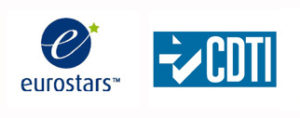R&D PROJECTS
Research at NEOS is driven by innovation and awareness of unmet clinical needs

NEOS Surgery works collaboratively with other technological companies and institutions in medical devices research projects, interacting and providing support at all stages. Many collaborations are interdisciplinary, or multidisciplinary, and all relationships are bespoke.
The goal of the HySpine project is to develop a new Pedicle Screw System to improve patient quality-of-life, simplify follow-up by clinicians, and rationalize overall healthcare costs and risks.
This project has obtained funding from the joint programme Eurostars-2 (project ID E! 10086), which is cofounded by the Spanish center for Industrial Technological Development (CDTI) and the Framework Programme for Research and Innovation Horizon 2020 of the European Union.

NEOS’ role within the project was focused on the creation of a new solution for the treatment of aneurysms with bioactive implantable polymers based on UreidoPyrimidinone material.
The project, which started in February 2013 and lasted four years, a received funding from the European Union’s Seventh Framework Programme for research, technological development and demonstration under Grant Agreement No. 310389.

Optogenerapy aims at developing and demonstrating a new optogenetics implant for controlled beta interferon (IFN- ß) protein delivery for treating patients suffering from multiple sclerosis. The new implant will be the result of the cooperation of 11 European partners, including Universities, Tech centres, Health institutions, SMEs and big companies.
This project has received funding from the European Union’s Horizon 2020 research and innovation under Grant Agreement No.720694.

The UltraClip project was a collaborative project undertaken by NEOS together with Ultrasion and Eurecat with the support of ACCIÓ.

NEOS was InnoClip‘s leader, in which Spanish and German partners were collaborating. The project obtained funding from the Spanish Centre for Industrial Technological Development (CDTI) through the Eurostars call of the Eureka! Secretariat.
This project received the JEC World 2016 Innovation Award.
